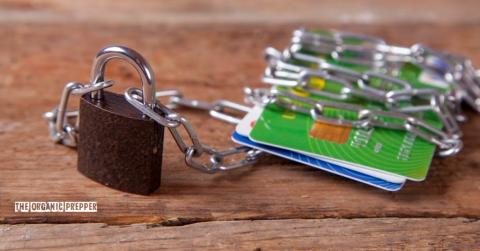Dr. Mercola Got Debanked and It’s Happened to Others, Too.

THE ORGANIC PREPPER
Remember the “Disinformation Dirty Dozen,” the group identified as responsible for 65% of anti-vaccine content on internet platforms? Their number one offender, Dr. Joseph Mercola, just got debanked. He was informed that Chase was closing all of his business and investment accounts, along with the personal accounts of his CEO, CFO, and their spouses and children.
This is pretty major, to have debanked not only the offender but also his employees and their children. How bad is this guy? What did he do to warrant such extreme action?
Who is Dr. Mercola?
Dr. Mercola grew up in the Chicago area and attended school to become an osteopathic physician. He is licensed to prescribe medicine and perform surgeries in all 50 states. He became interested in natural health after watching the integration of improved nutrition and exercise improve his patients’ outcomes.
Aside from treating patients, Dr. Mercola also began selling nutritional supplements and writing books, two of which have been New York Times bestsellers. He ran his various businesses in the Chicago area until about ten years ago when he moved to Florida.
Dr. Mercola has had his share of controversies over the years, like claiming that tanning beds prevent skin cancer. In spite of this, millions of people read his website and follow him on whatever social media platforms will allow him. Even if you don’t agree with all his claims, he still posts a variety of fascinating medical studies that make for interesting reading.
He has been a longstanding critic of the conventional vaccine regimen, so it was no surprise that he came out against the Covid jabs. As other prominent voices were being shut down and deplatformed, in 2021, Mercola decided to only post his articles for 48 hours at a time.
What many followers like myself do, sign up for his email list here, look over the daily articles for what seems interesting, and then download pdfs of anything promising. You can also check out his book, a USA Today, Wall Street Journal, and Publishers Weekly National Bestseller, The Truth About Covid 19. The paperback is less than $5 at the time this article was published.
Dr. Mercola is unusual in that he is willing to engage in discussions with people presenting different information. For example, he has been a big promoter of the ketogenic diet for a long time but has run multiple articles in the past six months with another nutritionist who argues against long-term ketogenic diets. The discussions are interesting, informative, and respectful. He offers the public what so many people desperately want and need, the opportunity to listen to experts present varying points.
Because of Dr. Mercola’s large clientele base and internet presence, he has been able to get his messages about natural health, and increasingly, about the irregularities in the Covid response, to many millions of people. And this is the only reason he can think of that explains the closure of his bank accounts.
He is not the only one who has been debanked.
As Dr. Mercola explains in his interview with GBNews he received no warning and no explanation from Chase as to the closure of his and his employees’ bank accounts. Now, GBNews is a British station, and they’ve been willing to interview Dr. Mercola when American stations haven’t, because they’ve been covering the debanking of British politicians.
In June, Nigel Farage, one of the major politicians behind Brexit, announced that his bank of over 40 years had closed his accounts. When he contacted other banks, nine others refused to bank with him as well. After Farage publicly complained about being debanked, many thousands of people came forward with their stories, claiming they had been debanked, too.
Other debanked British figures include podcasters Konstantin Kisin and Frances Foster, writer Toby Young, and Chancellor of the Exchequer Jeremy Hunt. Many politicians involved with Brexit, the rebranded Brexit Reform Party, and the Reclaim Party have also not been able to obtain bank accounts, making it incredibly difficult for those particular political movements to function.
At first, the British bank, Coutts, claimed that Farage’s account was not “commercially viable,” and within the first few days of Farage going public with his complaints, this was how the BBC tried to spin the situation.
However, Farage is well known enough it quickly became obvious that this was a complete lie. He had plenty of money in his accounts. And it soon became obvious, as well, that he had been targeted for his political beliefs. NatWest (Coutts’ parent company) Chief Executive Alison Rose and Coutts CEO Peter Flavel both resigned this week, as Farage’s claims became substantiated.
Farage has been able to make so much noise about being debanked that British politicians, even Rishi Sunak, his political opponent, have criticized the actions taken by banks against Farage. Going forward, British banks will have to provide reasons to customers who lose their accounts. It seems that, for now, British bank customers might get a reprieve from this particular social engineering technique.
Nigel Farage is a Donald Trump supporter; the two men have a great deal in common. They are often criticized for believing in controlled immigration. They’re a thorn in the side of global establishment figures because both men ran on platforms promoting national sovereignty.
Donald Trump has also been debanked. After the Jan. 6 protests, many banks severed ties with Trump. In March, PNC Bank closed the business accounts of Donald Trump Jr. relating to his news curation app, MxM News. However, this barely made news in the U.S.; a few conservative outlets reported on it, but none of the major legacy outlets did.



























